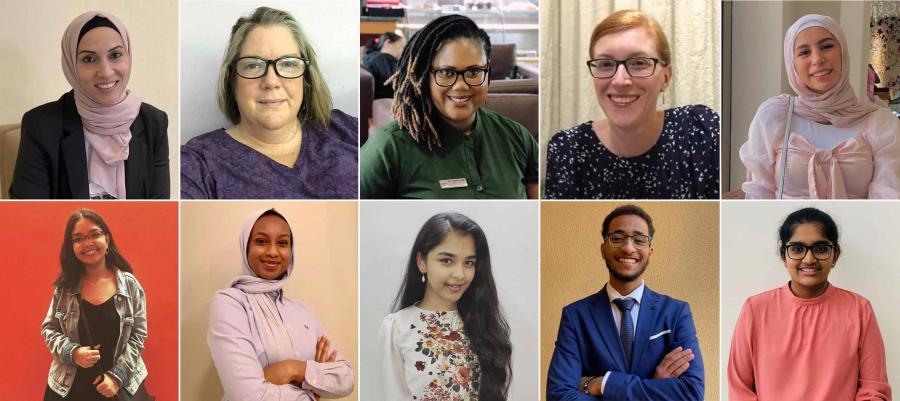- About
- Admissions
- Study at AUS
- Prospective Students
- Bachelor's Degrees
- Master's Degrees
- Doctoral Degrees
- Admission Publications
- International Students
- Contact Admissions
- Grants and Scholarships
- Sponsorship Liaison Services
- Testing Center
- New Undergraduate Student Guide
- Undergraduate Orientation
- New Graduate Student Guide
- Graduate Orientation
- File Completion
- Payment Guide
- Students with Disabilities
- Executive and Continuing Education
- Academics
- Life at AUS
- Research
- Publications
- Contact Us
- Apply Now
- .

AUS wins Best Green Campus Audit at Abu Dhabi Environment Agency’s Sustainable Campus Initiative
American University of Sharjah (AUS) was declared winner of the Best Green Campus Audit at the Sustainable Campus Initiative (SCI) in a virtual award ceremony organized by the Abu Dhabi Environment Agency recently.
The win was based on work done by the 2019–2020 AUS Green Team, a group of 23 students and alumni from various majors from across AUS, mentored by faculty members from the College of Arts and Sciences and staff from the AUS Sustainability office.
The Sustainable Campus Initiative, sponsored by Borouge, aims to harness the energy, innovation and tenacity of the youth to discover new environmental solutions for the world's most challenging issues. More than 20 universities in the UAE competed in the initiative’s two categories: Green Campus Audit and Sustainable Action Project.
In the winning Green Campus Audit report, the AUS team measured and analyzed five sustainability indicators—land (biodiversity and land use), water, waste, energy and climate change—providing their recommendations and future targets. The students’ work analyzed campus biodiversity by monitoring different species, the impact of microclimate (temperature and humidity) resulting from land use, daily water consumption and waste per capita, waste segregation and recycling, energy consumption per capita, and daily carbon dioxide emissions per capita. While students obtained relevant data with the assistance of the AUS Sustainability office, they had to also carry out their own analysis for several indicators, particularly general waste production and irrigation water use.
Environmental sciences student Ishraq Abdullah, who has participated in the Green Campus Audit since 2018, was part of the campus waste audit, which required the team members to weigh and measure the waste generated from the academic buildings.
“It was not an easy process, and sometimes we had to wait for long periods until the trash was assembled for auditing. However, this was useful in surveying and quantifying waste,” she said.
Although a challenging task, the team’s analysis directly led to changes on campus, with AUS Sustainability improving campus waste segregation and recycling.
“Due to the team’s waste audit, AUS Sustainability changed the categorization in the three-stream waste bins in the College of Engineering from Paper-Cans-Bottles to General Waste-Cans-Bottles. We found that paper was not recycled in the bins. By making this change, we hope that cans and bottles will have better separation rates. We were lucky that data gathering was completed prior the lockdown, after which students worked on data analysis,” said Dr. Sandra Knuteson, Senior Lecturer in Biology, Chemistry and Environmental Sciences at AUS and one of the team’s mentors.
The water audit looked at water use for irrigation and landscaping. “We went out to the green fields on campus, wrapped the irrigation nozzles with a plastic bag and let them fill for 10 seconds. In the lab, we systematically recorded the volume of water in each of the bags per inspected area, then estimated the campus’ water usage for irrigation,” said Harshali Sajnani, a biology student in her second year, who worked on the audit.
She added: “The AUS Sustainability office also provided us with water bills to help estimate quantities of water used for drinking, washing, flushing and other purposes. The vending machine suppliers also provided us with data on how many water bottles are used monthly by students. We researched costs of sourcing, treating and transporting water on government websites, then combined all the data in the audit.”
In the competition’s Sustainable Action Project category, the team developed 14 training videos in seven languages to raise awareness of waste separation and recycling for the diverse cleaning crews on campus. Mariam Jacobs, architecture alumna and project student coordinator, worked on the outreach and education campaign for recycling and the video production.
“I was intrigued by the crossover between what I studied on ethical and sustainable building in theory and being part of an initiative that puts this theme into practice on campus. While several challenges affected the continuation of the project, we managed to soldier through despite the lockdown. We recruited volunteers who spoke the required languages, and ensured the quality of content and audio,” she said.
The AUS Green Team has been honored before in the SCI competition, winning at least one top award category in each of the previous competition cycles since 2016. AUS received the award for Best Green Campus Audit and Best Sustainability Action Project for a program it ran last year with high schools as part of the university’s Sharakah partnership program. Students were challenged to minimize consumption of single-use plastics through practical creative solutions.
AUS is widely recognized for its sustainability initiatives, and is the MENA region's best performing university in the Association for the Advancement of Sustainability in Higher Education’s Sustainability Tracking, Assessment and Rating System.
Members of the Green Team 2019–2020
Ahlam Khaldoune (Civil Engineering)
Mayada Farah (Civil Engineering)
Marya Buhlaigah (International Studies)
Amineh Moshref (Biology)
Sarah Tariq (Biology)
Dunia Halawa (Biology)
Aseel Amer (Biology)
Harshali Sajnani (Biology)
Mohamed Yousef (Environmental Science)
Navya Muraly (Marketing)
Mariam Jacobs (Architecture)
Team Mentors
Dr. Sandra Knuteson, Senior Lecturer in Biology, Chemistry and Environmental Sciences
Dr. Fatin Samara, Associate Professor in Biology, Chemistry and Environmental Sciences
Dr. Jeniece Lusk, Assistant Professor in International Studies
Rose Armour, AUS Sustainability
Julia Macallister, AUS Sustainability

